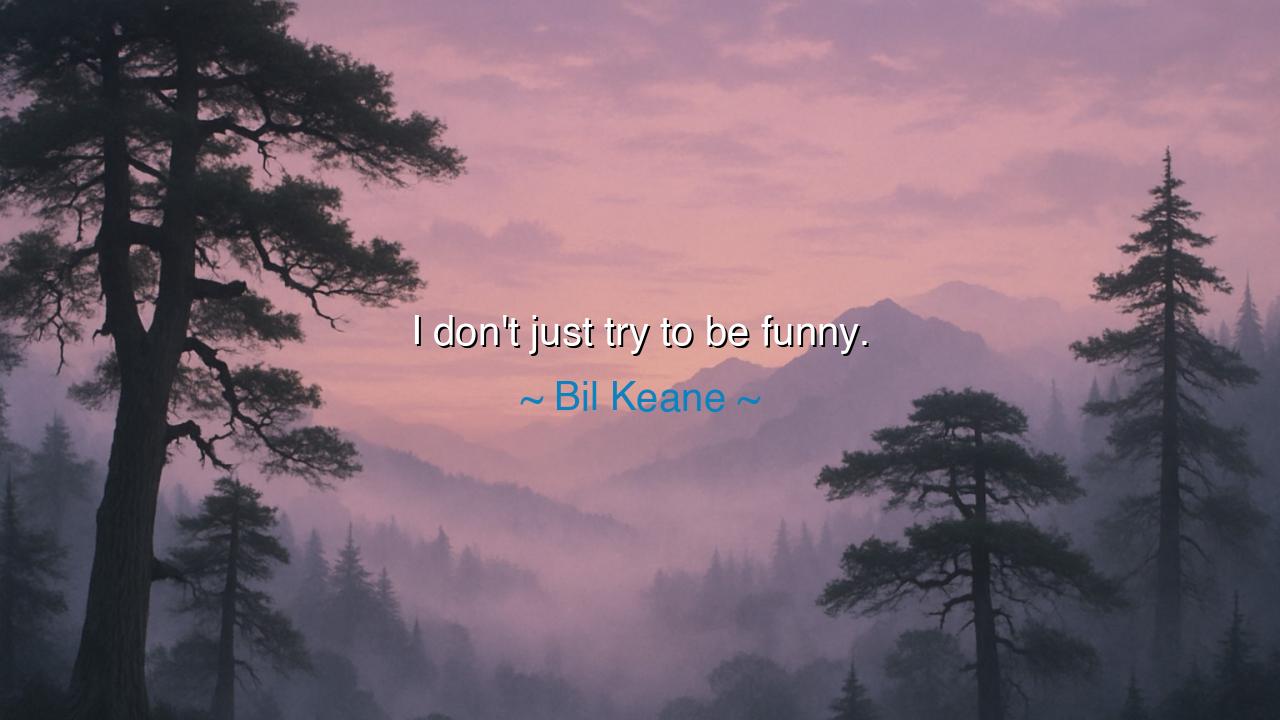
I don't just try to be funny.






“I don’t just try to be funny.” Thus spoke Bil Keane, the gentle craftsman of the comic strip The Family Circus, whose art brought laughter not through mockery or satire, but through tenderness. At first glance, the words seem simple — modest even. Yet beneath their surface lies a philosophy as deep as the roots of compassion itself. For Keane was not speaking only of humor; he was speaking of intention, of the sacred duty of the artist to move the heart, not merely to provoke a laugh. He understood that the truest humor springs not from cruelty, but from love — from a desire to illuminate, not to wound.
In the ancient world, humor was often regarded as a divine gift — a spark from the gods that lifted the weary spirit and revealed wisdom through joy. The philosopher Aristotle himself declared that laughter was one of the unique powers that set humankind apart, a sign of intelligence and of community. Yet he also warned that laughter, untempered by empathy, could become a weapon of arrogance. Bil Keane’s words echo that eternal truth: that to be funny is not enough, unless one’s laughter leads the heart toward understanding. In his world of round-faced children, simple homes, and everyday mischief, he built not just jokes, but reminders — that love, family, and innocence are the soil from which true happiness grows.
When Keane says, “I don’t just try to be funny,” he reveals the hidden labor of the storyteller: the shaping of meaning beneath the laughter. Each of his comic panels carried a whisper of truth about ordinary life — the father’s patience, the child’s curiosity, the mother’s quiet strength. His humor was a mirror held up to our most familiar moments, showing us that joy does not depend on grand achievements, but on small acts of kindness. Like the poets of old, he sought not applause but connection. His gift was not merely to amuse, but to remind — to awaken gratitude for the sacred ordinary.
Consider the example of another who understood this balance: Charles Schulz, creator of Peanuts. Like Keane, Schulz did not chase laughter for its own sake. His jokes were wrapped in melancholy, his humor touched by longing. Through Charlie Brown’s endless defeats, Schulz taught that humor is often born of humility — that to laugh at our flaws is to forgive ourselves. Both Schulz and Keane practiced what the ancients would call pathos through mirth — the weaving of sorrow and sweetness into one tapestry. Their art did not simply entertain; it comforted, it healed.
In truth, all great humor contains wisdom disguised as play. The court jesters of medieval times, like the philosophers of Greece, spoke their truths through laughter, for they knew that the mind opens most easily when the heart smiles. Bil Keane belonged to that lineage — not a cynic mocking the world’s folly, but a sage reminding it of its better nature. His statement, then, becomes a quiet declaration of purpose: that humor should serve the soul, not the ego. To make others laugh is good; to make them feel is divine.
The origin of Keane’s quote lies in his lifelong devotion to his craft. When asked about the secret of his success, he often spoke of family — of how his wife and children inspired his work. He observed their quirks, their warmth, their innocence, and turned them into art that reflected not just his family, but the universal heart of all families. He was not content to be clever; he wished to be true. “I don’t just try to be funny,” he said, because humor alone fades, but love — the kind that underlies it — endures across generations. His comic strips were sermons in simplicity, teachings disguised as laughter.
So, my friend, take this lesson into your own life: do not seek only to amuse or impress, but to uplift. Whether you speak, write, or create, let your intention carry warmth as well as wit. Let your laughter have depth. Ask yourself not merely, “Will this make them laugh?” but “Will this make them see?” For the world is already filled with noise and jesters who chase empty laughter. What it hungers for are those who bring joy with meaning — who remind others, through gentleness or humor, of what is worth cherishing.
For as Bil Keane’s words teach us, laughter is not the end of art, but its beginning — the gateway to truth. To be funny is easy; to be human while being funny is rare. The wise do not make others laugh to distract them from pain, but to help them endure it. So let your humor, like Keane’s, spring from love, and let your laughter carry wisdom’s echo. For laughter that heals, that connects, that comforts — that is the laughter that outlives us all.






AAdministratorAdministrator
Welcome, honored guests. Please leave a comment, we will respond soon